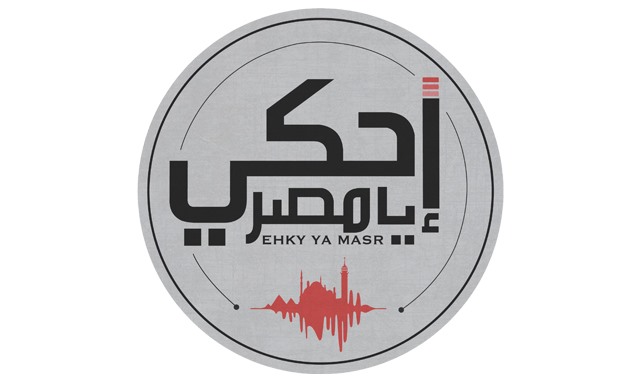
Ehky Ya Masr is a narrative podcast that launched from Cairo this Ramadan. Logo via Ehky Ya Masr.
CAIRO-27 June 2017: While television drama and radio series usually mark Ramadan in Egypt, this year, the internet welcomed a different kind of series. Ehky Ya Masr is a narrative podcast produced by collective audio enthusiasts to celebrate details of life in Egypt. The podcast presents short English and Arabic audio features.
From the story of the “fanous” (lantern) to the economics of spending in Ramadan, and from how children relate to practices of the holy month to the experience of going on an Islamic fast for the first time, every episode presented a unique story told by a different narrator and different interviewees. Every story was made conveniently available online for the audience to listen to at their convenience and on the device they choose.
Kim Fox, an associate professor at the American University in Cairo Department of Journalism and Mass Communication and the executive producer of Ehky Ya Masr, told Egypt Today that the idea started when she noticed that students were graduating with interest and skills in narrative audio storytelling but could not find a way to continue producing similar audio stories professionally.
About three months ago, Fox put together a team of nine former students to work on the podcast.
“We feel like we’re filling the void of the narrative storytelling - you know- the features, what you’ll hear a lot in the U.S. in terms of This American Life style of audio storytelling,” she said.
By the beginning of Ramadan, the podcast’s first series took off on Soundcloud and PRX under the theme of the holy month.
The team behind it
Kanzy Mahmoud, a former journalism student whose full-time job is in the field of energy development, produced an episode for the series comparing Ramadan in the past to Ramadan nowadays.
“I felt like this was an opportunity for me to do something I enjoy in parallel to my day-to-day job,” said Mahmoud.
For her episode, Mahmoud interviewed her mother and her aunt about their memories of Ramadan in the past and she added her own experiences with the month of fasting.
Though her final piece was only three and a half minutes, the production process required a lot of time.
“Your piece has to be based on really good sound bites from your interviewees. The story is rendered based on what they have to say and how they say it. So, I always record for a long time,” said Mahmoud.
With over an hour of recordings, she started a long editing process.
Like the interview with Mahmoud’s mother, most of the interviews have been done outside studios.
Shaza Walid, who works in social media, produced for Ehky Ya Masr a profile about Egypt’s most prominent female mesaharaty (traditionally, that’s an individual who roams the streets at night to remind those who are fasting to have sohour).
Though Walid’s experience includes producing an award-winning audio documentary, she was nervous about recording in an uncontrollable environment for Ehky Ya Masr.
“I was a bit worried about how to record outside a studio and use a recorder and technicalities and all that, but thankfully, things went very well,” she said.
Walid ended up recording in a house with her own recorder and shotgun microphone.
With limited resources in terms of equipment, time and recording space, both Walid and Mahmoud had their motives to produce their episodes.
“It makes me happy to make other people happy. Storytelling is entertaining. It makes people happy and it’s still very informative,” said Mahmoud.
Currently, Fox, Mahmoud and Walid along with other Ehky Ya Masr producers are working on a second series, which would also include English and Arabic episodes while they continue to promote their Ramadan series. The theme of the coming series is yet to be determined.
The radio industry has started in Egypt in the 1920s. Today, radio has the second largest audience to follow television according to an article published by the European Journalism Centre.
With the ubiquity of mobile devices and the internet, some radio stations have made their shows available online like Nogoum FM while other stations have started their broadcasting solely online like Nineties FM. More recently, podcasts that allow the listener even more control over what they hear and when they listen, have been slowly making a presence in Egypt and the surrounding region.

Comments
Leave a Comment